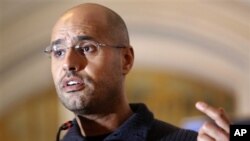The chief prosecutor of the International Criminal Court says his office is collecting evidence against former Libyan dictator Moammar Gadhafi’s son Seif al-Islam and the regime’s former intelligence chief in preparation for their eventual trial. Luis Moreno-Ocampo also told the U.N. Security Council Wednesday that his office has concerns that Seif al-Islam may try to flee the country.
Prosecutor Ocampo said that the court has received information that a group of mercenaries may be trying to facilitate Seif al-Islam Gadhafi’s escape from Libya. “We are calling upon states to do all they can to disrupt any such operation,” he said.
There have been reports that the dictator’s son may try to flee to Niger or another African country.
Ocampo said his office has received questions from individuals linked to Saif al-Islam about what would happen to him if he appeared at The Hague, if he could be sent back to Libya and what would happen to him if he was convicted or acquitted.
The prosecutor said the court could order that he not be returned to Libya after his conviction or acquittal and be sent to a different country, as long as one would accept him. Ocampo also said the court could provide Gadhafi with safe passage to The Hague. He said that could include sending a U.N. plane to pick him up at a designated location.
In June, the International Criminal Court issued warrants against Seif al-Islam and his father, accusing them of orchestrating a widespread campaign of murder and persecution against political opponents.
Also charged is former intelligence chief, Abdallah Senoussi, who is accused of commanding and implementing the operation to kill civilians. Ocampo told reporters that the court “knows less” about Senoussi’s whereabouts than Seif al-Islam’s.
The prosecutor also said the court is investigating reports of mass rapes by Gadhafi’s security forces, gathering evidence from sources that could include doctors, hospitals, clinics and psychologists, in an effort to limit the exposure of victims in a society that considers rape one of the most serious crimes.
“While it is premature to draw conclusions on specific numbers, the information and evidence indicates at this stage that hundreds of rapes were committed during the conflict,” Ocampo said.
He said his office is also continuing to search for the assets of Seif al-Islam and Abdallah al-Senussi for the potential benefit of victims through reparations awarded by the court.
Ocampo told the council that his office is also investigating allegations of crimes committed by NATO forces during their maintenance of the No-Fly Zone to protect civilians, as well as allegations against National Transitional Council-related fighters, and additional criminal accusations against pro-Gadhafi forces.
During Wednesday’s meeting, Libyan deputy U.N. Ambassador Ibrahim Dabbashi said the interim government would closely cooperate with the ICC prosecutor concerning the indictees, but did not explicitly say they would send them to the court. Libya’s transitional authorities have said that they want to try Saif al-Islam and Abdullah al-Senussi in Libya.










